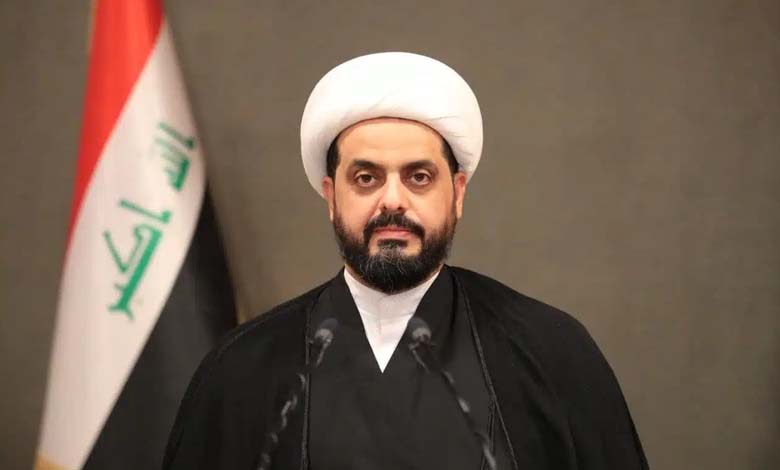Khazali seeks to transition from armed leader to parliamentary contender

The success of Asa’ib Ahl al-Haq in the Iraqi parliamentary elections would represent another step in Qais al-Khazali’s efforts to reposition himself, granting him increased influence within the Shiite leadership and a stronger role in government formation.
-
Al-Sudani’s Openness to Normalization with Syria Fuels Divisions within the Coordination Framework
-
Attack on Saraya al-Salam Headquarters Disrupts Security Calm in Diyala
Qais Khazali, head of an armed faction classified as an international terrorist organization by the United States and considered a key ally of Iran, seeks to bolster his public image to become one of Iraq’s leading political figures.
The success of his movement, Asa’ib Ahl al-Haq, allied with Iran, in next Tuesday’s legislative elections would mark another milestone in his efforts to reestablish his political presence, enhancing his influence within the Shiite leadership and his sway over government formation.
This success would also support the movement’s transition from an armed faction to a political force and help strengthen the influence of Iran-aligned groups in Iraq’s political landscape.
-
Iran Seeks Development Path to Prevent Turkey from Dominating Iraq
-
Containing the Unrest in Kirkuk Does Not Mean the End of the Crisis
However, a weak performance by Asa’ib Ahl al-Haq, which previously secured parliamentary seats, would be a major setback for Khazali’s efforts to reshape his image and could undermine Iran’s broader strategy to maintain influence over its allied factions in Iraqi politics.
Many Iraqis fear the elections will bring little change, given the failure of elites, including Iran-aligned armed groups, to deliver results since the U.S.-led invasion in 2003. Shiite groups backed by Tehran, such as Khazali’s Asa’ib Ahl al-Haq, have gained significant influence since the overthrow of Saddam Hussein and his Sunni-dominated government.
Asa’ib Ahl al-Haq is unlikely to make significant gains next Tuesday, having won five parliamentary seats in the 2021 elections as part of a coalition. Nevertheless, the movement hopes to maintain a similar level of support or slightly improve its performance compared to the previous elections.
-
Al-Sadr Prevents Random Displays of Peace Brigades, Fearful of Infiltration
-
Al-Sadr return to politics through the gateway of provincial council elections
Khazali emerged following the chaotic U.S. invasion. In 2007, he was arrested by U.S. forces for allegedly participating in an attack on a government complex in Karbala, a Shiite stronghold in southern Iraq, which killed five U.S. soldiers. He was released after about three years in the U.S. Camp Crober prison in Iraq.
Former British officials have previously linked Asa’ib Ahl al-Haq to the kidnapping of British programmer Peter Moore, released in 2009. Khazali fought with the Mahdi Army of Shiite cleric Moqtada al-Sadr against U.S. forces but split from him in 2006 to form the armed Asa’ib Ahl al-Haq movement.
The movement carried out numerous operations against U.S. and Iraqi forces and fought the Islamic State when it controlled a third of the country, as well as in the neighboring Syrian civil war. Many fighters moved to northern Iraq to fight IS, armed and wearing green camouflage uniforms.
-
What’s happening in Iraq? The Coordination Framework enters into clashes over the election law
-
Iraq – US reports show the extent of Iran’s penetration of Al Sudani government
Other former armed group leaders have attempted to enter politics, though these efforts sparked controversy due to their ties to unaccountable fighters, with some building commercial empires.
In 2012, Khazali — whose armed group had attacked foreigners during the Iraq war — announced that the movement would lay down its arms and was ready to join the political process. He stated: “This phase of military conflict between the Iraqi armed resistance and occupation forces has ended, with a clear and historic Iraqi victory and a clear and historic American failure.” He also indicated the movement was ready to return the remains of British guard Alan McMenemy, kidnapped with four others in 2007, without conditions. Critics note, however, that Asa’ib Ahl al-Haq continues to engage in violence despite announcing its readiness to disarm and join politics.
In 2020, Khazali stated there was no justification for thousands of U.S. troops remaining in Iraq after the defeat of IS, warning they would be considered an occupying force if they did not leave.
-
Iraq – Al Sudani resolves dispute over the administration of the intelligence service
-
Iraq: Forming a government is a difficult task; details
Previously, the Iraqi parliament supported the prime minister’s recommendation to end the presence of foreign forces, following the U.S. assassination of Qassem Soleimani, commander of the Iranian Revolutionary Guards, and Abu Mahdi al-Muhandis, deputy head of the Iraqi Popular Mobilization Forces.
That same year, the U.S. State Department designated Khazali as an international terrorist. Then-Secretary of State Mike Pompeo stated that Asa’ib Ahl al-Haq and its leaders were Iranian agents, using violence to support Tehran’s efforts to “undermine Iraq’s sovereignty.”
Despite leading an armed faction, Khazali avoided participating in anti-U.S. violence during protests against the Israeli military campaign in the Gaza war and engaged with the Iraqi Ministry of Education, which signed a major agreement with the World Bank.
-
Does al-Kazimi turn the wheels around?
-
Why are Iran’s militias escalating their threats against the Kurds in Iraq?
Born in 1974 in the impoverished Sadr City district of Baghdad, Khazali has long been viewed as a potential political candidate. He denied his armed faction’s involvement in the sectarian massacre that killed thousands in 2006 and 2007 and stated he is not wanted by the Iraqi government for any crime.
In 2019, the U.S. Treasury Department imposed sanctions on him and two other armed faction leaders for human rights violations following the deaths of civilians during protests. Asa’ib Ahl al-Haq was accused of firing on civilians and killing them.












